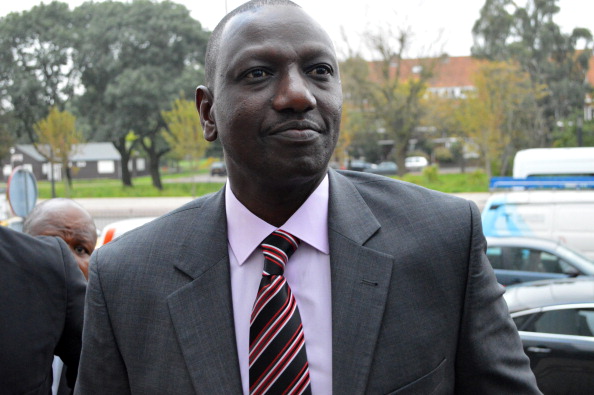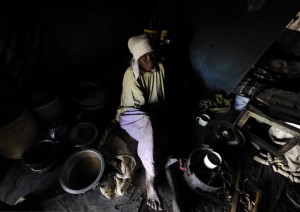
Kenyan Deputy President William Ruto arrives on September 23, 2013 at the International Criminal Court in The Hague.
On September 5, the Kenyan parliament passed a motion to withdraw Kenya from the International Criminal Court. The decision came about days before Vice President Samoei Ruto faced trial at The Hague following his indictment for committing crimes against humanity in the bloody 2007 elections violence.
Last week, the African Union announced it would hold a special session in early October to discuss whether the AU members should withdraw from the ICC even as they announced plans to request that the hearings be transferred to Nairobi. The case has raised a critical and ongoing challenge to human rights in Africa:
Can political leaders in Africa be held to account for committing serious human rights abuses?
In 2007, the soul of Kenyan democracy was exposed to harsh realities with the onset of the ethnic violence that erupted after the highly contentious elections which saw President Mwai Kibaki win re-election for another 5 years. 1200 people were killed, some burnt beyond recognition, and others selectively eliminated, based on orders carried out by an army of youth. The silent horrors faced by the victims are etched in scars on the faces of survivors and are forever enshrined in their tent homes.
The first witness to testify against Ruto was a survivor of the Kiambaa Church attack, where 50 people were burnt in a church where they had gone to seek refuge from an assault orchestrated by a gang of Kalenjin youth. A 37-year-old worker on a flower farm, he told Amnesty how gruesome it was.
“I am a Luo…I have been a casual worker here in Naivasha for some time…I saw this when I was at the chief’s area. There were about eight of us who went to the chief’s house. While we were seeking refuge, we saw it happening, I saw people being chopped with machetes, and I told the police and they also saw,” Amnesty International reported.
Sadly, accountability for the Kiamba incident and the rest of the Rift Valley violence remain unfulfilled. Efforts inside Kenya to bring the perpetrators to justice have stalled: The Waki Commission’s call for the creation of a special tribunal has not been answered.
There are several facts that are being ignored or distorted by the champions for Kenya’s withdrawal and these need to be exposed and discredited.
At the international level, the African Union Panel of Eminent African Personalities led by former UN Secretary General Kofi Annan handed over a sealed list of names to the ICC in July 2009 at the request of Judge Phillip Waki who led the Waki commission of inquiry into the violence. This was part of the peace accords that formed the coalition government between president Kibaki and his opponent Raila Odinga and helped end the violence. The ICC gave the Kenyan authorities until 2010 to move forward on creating a special tribunal focused on the Rift Valley violence or it would refer the case to the ICC’s Prosecutor.
In August 2013, ICC Prosecutor Fatou Bensouda opened the case against Vice President Ruto which led to the public repudiation of the ICC by the Kenyan Parliament.
There are several facts that are being ignored or distorted by the champions for Kenya’s withdrawal and these need to be exposed and discredited.
First, the ICC has always been meant to complement national justice systems, not replace them. It’s designed to serve as the court of last resort, acting only when national courts are unable or unwilling to act, recognizing that national courts have a responsibility to investigate and prosecute grave crimes committed on their territory. Indeed the narrative around how we got to this situation underscores this fact: it was the Kenyan judge, appointed by the Kenyan government to investigate the violence, who asked Mr. Annan to give the names of potential suspects to the ICC. He did so out of concern that no effective action would be taken in Kenya by the Kenyan authorities. Four years later, the government’s failure to set up a local tribunal has proved Judge Waki tragically prescient.
The lack of political will and leadership from the executive branch of government and political circus between Members of Parliament who supported establishing a local tribunal and those who chanted for days on end “Don’t be vague! Let’s go to Hague” meant the Kenyan Parliament never seriously took action to create the tribunal. Indeed records of the 10th Parliament Hansard show that neither former President Kibaki nor Prime Minister Raila Odinga tried to rally MP’s in the house to set up a special tribunal to try the suspects of the post-election violence and as such the vote for a local tribunal fell below the two thirds threshold required.
There is also the spurious claim that the ICC is anti-African as it now has cases underway against Omar Hassan Ahmad Al-Bashir, current president of Sudan, Lord’s Resistance Army leader Joseph Kony and others. This claim is spurious. Firstly, the widespread support of African countries was crucial to the establishment of the ICC. The ICC’s Prosecutor and five of its judges are from African countries. Secondly, five of the investigations involving African countries were referred to the ICC by the African countries themselves, and two were referred to the Court by the U.N. Security Council. Thirdly, the Court has conducted or is conducting preliminary examinations in a number of other situations on different continents, including Colombia, Iraq, Afghanistan, the Occupied Palestinian Territories, Venezuela and the Republic of Korea.

Peris, 92, sits in her makeshift tent that she has lived in for three years at ‘Ya-Mumbi’ IDP camp as she waits for ICC announcement.
It is also an outrageous claim when the cases against President Kenyatta and Vice President Ruto are on behalf of 1200 Kenyans (who were Africans) slaughtered by fellow Kenyans and allegedly at the behest of political leaders from their own countries. In making this claim, political leaders have both underscored that they alone represent the nation and the continent and that ordinary African citizen do not. This is not novel to Africa and goes back to continent’s emergence from colonialism when liberation fighters and founding fathers were accepted as the embodiment of new fragile political entities. Subsequent political leadership continued to appropriate this status onto themselves and further embedded the understanding that the political leaders continued to be above the law, even at the expense of their own citizens.
At the start of 2013, Kenya elected Uhuru Kenyatta, the son of Kenya’s first president, Jomo Kenyatta, president – despite concerns over his possible involvement in the Rift Valley violence dating back to the 2007 election itself. Kenyatta’s election and the vote in parliament send a clear message that the status quo of official impunity remains in place and that justice for the common person in Kenya will be the exception. This must be challenged.
The ICC case must go forward and it must lead to effective justice and accountability, as well as greater stability in Kenya. It is not one or the other: Kenya and Africa need both.
Darsso Paul Gache helped prepare this blog.
If the abuse is grave anybody under the sun may be indicted. Nobody should have the right to exclude himself from the jurisdiction of ICJ. It is the call of the time.
Sad news, there should have been a definitive milestone set to end such dreadful mass murder atrocities.
Sincerely,
Inez Deborah Emilia Altar
To "withdraw" from the ICC as a permissive measure is something that several nations beyond Kenya have done, some to wash their hands of their own complicity in politically sanctioned choices relating to the complicated task of governance, others to avoid being judged on the international stage altogether. What good is having an ICC or a UN when it becomes a choice and the very people who the world community is trying to persuade can simply opt-out of the conversation.